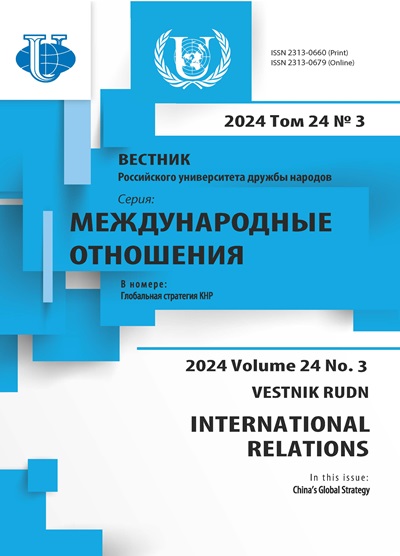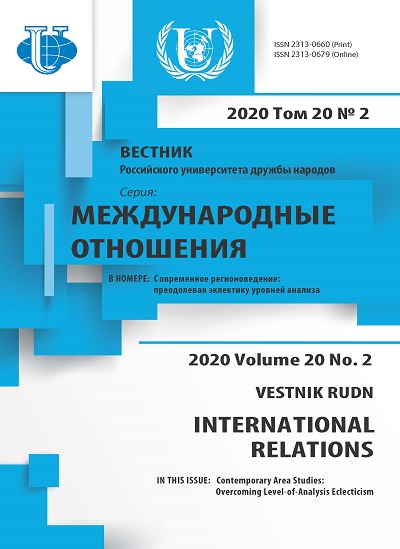Сравнительное регионоведение и исследование Глобального Юга
- Авторы: Сил Р.1, Ахрам А.И.2
-
Учреждения:
- Университет Пенсильвании
- Политехнический университет Виргинии и университет штата
- Выпуск: Том 20, № 2 (2020): Современное регионоведение: преодолевая эклектику уровней анализа
- Страницы: 279-287
- Раздел: ТЕМАТИЧЕСКОЕ ДОСЬЕ
- URL: https://journals.rudn.ru/international-relations/article/view/23970
- DOI: https://doi.org/10.22363/2313-0660-2020-20-2-279-287
Цитировать
Полный текст
Аннотация
Сравнительные региональные исследования (СРИ) предлагают инструментарий, позволяющий вернуть Глобальный Юг на передний план исследований в области социальных наук. СРИ призывают исследователей не бояться сталкиваться и изучать, казалось бы, значительную эмпирическую вариацию, обнаруживаемую при сравнении различных регионов мира. СРИ предлагают три сравнительных метода: внутрирегиональный, сравнение соседних регионов и трансрегиональные сравнения. Ряд исследователей уже применяли методику СРИ до того, как они были выделены в отдельное методологическое направление со своими более глобальными задачами и представлениями о сравнительных исследованиях в целом. СРИ разрушают предположения о дискретных, фиксированных «региональных» или цивилизационных блоках, а также построении номотетических теорий, нацеленных на универсальные законы. В то же время СРИ продвигают идею построения теории среднего уровня, концентрируясь на большей эмпирической строгости и индукции, с целью создания терминологии и анализа, являвшихся бы экстраполируемыми, но в то же время контекстуализируемыми. Эти макроисторические теории должны более тщательно учитывать пространственные и временные изменения в социальном мире. В частности, для изучения Глобального Юга СРИ дают возможность агрегации и использования широкого спектра наблюдений и интерпретаций, предлагаемых специалистами по столь различным регионам, как Южная Азия, Ближний Восток, Латинская Америка и Тропическая Африка. Таким образом, СРИ вносят изменения в разделение труда в социальных науках, позволяющие предоставить бóльшую роль исследованиям, проводимым в развивающихся странах.
Ключевые слова
Об авторах
Рудра Сил
Университет Пенсильвании
Email: rudysil@sas.upenn.edu
профессор политологии и директор (SAS) Программы Хантсмана по международным исследованиям и бизнесу Филадельфия, США
Ариэль И. Ахрам
Политехнический университет Виргинии и университет штата
Email: ahram@vt.edu
доцент, школа публичных и международных отношений Арлингтон, США
Список литературы
- Abbott, A. (1988). Transcending General Linear Reality. Sociological Theory, 6 (02), 169-186. doi: 10.2307/202114
- Acharya, A. (2007). The Emerging Regional Architecture of World Politics. World Politics, 59 (04), 629-652. doi: 10.1353/wp.2008.0000
- Ahmed, A. & Sil, R. (2012). When Multi-Method Research Subverts Methodological Pluralism - or, Why We Still Need Single-Method Research. Perspectives on Politics, 10 (04), 935-953. doi: 10.1017/S1537592712002836
- Ahram, A.I. (2011). The Theory and Method of Comparative Area Studies. Qualitative Research, 11 (01), 69-90. doi: 10.1177/1468794110385297
- Ahram, A.I., Köllner, P. & Sil, R. (Eds.). (2018). Comparative Area Studies: Methodological Rationales and Cross-Regional Applications. New York: Oxford University Press. doi: 10.1093/oso/9780190846374.001.0001
- Basedau, M. & Köllner, P. (2007). Area Studies, Comparative Area Studies, and the Study of Politics: Context, Substance, and Methodological Challenges. Zeitschrift für Vergleichende Politikwissenschaft, 1 (01), 105-124. doi: 10.1007/s12286-007-0009-3
- Bates, R.H. (1997). Controversy in the Discipline: Area Studies and Comparative Politics. PS: Political Science and Politics, 30 (02), 166-169. doi: 10.2307/420485
- Berg-Schlosser, D. (2012). Mixed Methods in Comparative Politics: Principles and Applications. London: Palgrave Macmillan. doi: 10.1057/9781137283375
- Brownlee, J. (2007). Authoritarianism in an Age of Democratization. Cambridge: Cambridge University Press. doi: 10.1017/CBO9780511802348
- Chen, C.P. (2015). Made in Italy (by the Chinese): Migration and the Rebirth of Textiles and Apparel. Journal of Modern Italian Studies, 20 (01), 111-126. doi: 10.1080/1354571X.2014.973160
- Chen, C.P. (2018). Organizing Production across Regions: The Wenzhou Model in China and Italy. In: Ahram, A.I., Köllner, P. & Sil, R. (Eds.). Comparative Area Studies: Methodological Rationales and Cross-Regional Applications. New York: Oxford University Press. doi: 10.1093/oso/9780190846374.001.0001
- Chernilo, D. (2011). The Critique of Methodological Nationalism: Theory and History. Thesis Eleven, 106 (01), 98-117. doi: 10.1177/0725513611415789
- Dunning, T. (2012). Natural Experiments in the Social Sciences: A Design-Based Approach. Cambridge: Cambridge University Press. doi: 10.1017/CBO9781139084444
- El Kurd, D. (2019). Polarized and Demobilized: Legacies of Authoritarianism in Palestine. London: Hurst.
- Fioretos, O., Falleti, T.G. & Sheingate, A. (Eds.) (2016). The Oxford Handbook of Historical Institutionalism. Oxford University Press. doi: 10.1093/oxfordhb/9780199662814.001.0001
- Frazier, M.W. (2019). The Power of Place: Contentious Politics in Twentieth-century Shanghai and Bombay. Cambridge: Cambridge University Press. doi: 10.1017/9781108698450
- Goodin, R.E. & Tilly, C. (Eds.). (2006). The Oxford Handbook of Contextual Political Analysis. Oxford University Press. doi: 10.1093/oxfordhb/9780199270439.001.0001
- Harbers, I. & Ingram, M.C. (2017). Geo-Nested Analysis: Mixed-Methods Research with Spatially Dependent Data. Political Analysis, 25 (03), 289-307. doi: 10.1017/pan.2017.4
- Heller, P. (2012). Democracy, Participatory Politics and Development: Some Comparative Lessons from Brazil, India and South Africa. Polity, 44 (04), 643-665. doi: 10.1057/pol.2012.19
- Huber, E. (2003). Letter from the President: The Role of Cross-Regional Comparison. APSA-CP Newsletter, 14 (02), 1-6.
- Katzenstein, P.J. (2015). A World of Regions: Asia and Europe in the American Imperium. Ithaca: Cornell University Press.
- King, G. (1996). Why Context Should not Count. Political Geography, 15 (02), 159-164. doi: 10.1016/0962-6298(95)00079-8
- Köllner, P., Sil, R. & Ahram, A.I. (2018). Comparative Area Studies: What It Is, What It Can Do. In: Ahram, A.I., Köllner, P. & Sil, R. (Eds.). Comparative Area Studies: Methodological Rationales and Cross-Regional Applications. New York: Oxford University Press. doi: 10.1093/oso/9780190846374.001.0001
- Lewis, M.W. & Wigen, K. (1997). The Myth of Continents: A Critique of Metageography. Berkeley: University of California Press.
- Lieberman, E. (2009). Boundaries of Contagion: How Ethnic Politics Have Shaped Government Responses to AIDS. Princeton: Princeton University Press.
- Mahoney, J. & Thelen, K. (Eds.) (2015). Advances in Comparative-Historical Analysis. Cambridge: Cambridge University Press. doi: 10.1017/CBO9781316273104
- Mainwaring, S. & Pérez-Liñán, A. (2007). Why Regions of The World Are Important: Regional Specificities and Region-Wide Diffusion of Democracy. In: Munck, G.L. (Eds.). Regimes and Democracy in Latin America. Theories and Methods. Oxford Studies in Democratization. New York: Oxford University Press. P. 199-229.
- McDermott, R. (2011). Internal and External Validity. In: Lupia, A., Green, D.P., Kuklinski, J.H. & Druckman, J.N. (Eds.). Cambridge Handbook of Experimental Political Science. Cambridge: Cambridge University Press. P. 27-40. doi: 10.1017/CBO9780511921452
- Mylonas, H. & Shelef, N. (2017). Methodological Challenges in the Study of Stateless Nationalist Territorial Claims. Territory, Politics, Governance, 5 (02), 145-157. doi: 10.1080/21622671.2017.1284020
- Pepinsky, T.B. (2017). Regions of Exception. Perspectives on Politics, 15 (04), 1034-1052. doi: 10.1017/S1537592717002146
- Peters, B.G. (2019). Institutional Theory in Political Science: the New Institutionalism. Cheltenham: Edward Elgar Publishing.
- Rihoux, B. & Ragin, C.C. (Eds.) (2008). Configurational Comparative Methods: Qualitative Comparative Analysis (QCA) and Related Techniques. London: Sage Publications.
- Saylor, R. (2014). State Building in Boom Times: Commodities and Coalitions in Latin America and Africa. Oxford: Oxford University Press.
- Schaffer, F.C. (2018). Two Ways to Compare. Qualitative and Multi-Method Research, 16 (01), 15-19. doi: 10.5281/zenodo.2562165
- Sidaway, J.D. (2013). Geography, Globalization, and the Problematic of Area Studies. Annals of the Association of American Geographers, 103 (04), 984-1002. doi: 10.1080/00045608.2012.660397
- Sil, R. (2002). Managing “Modernity”: Work, Community, and Authority in Late-Industrializing Japan and Russia. Ann Arbor: University of Michigan Press. doi: 10.3998/mpub.17256
- Skocpol, T. & Somers, M. (1980). The Uses of Comparative History in Macrosocial Inquiry. Comparative Studies in Society and History, 22 (02), 174-197. doi: 10.1017/S0010417500009282
- Smith, B. (2018). Comparing Separatism across Regions: Rebellious Legacies in Africa, Asia, and the Middle East. In: Ahram, A.I., Köllner, P. & Sil, R. (Eds.). Comparative Area Studies: Methodological Rationales and Cross-Regional Applications. New York: Oxford University Press. doi: 10.1093/oso/9780190846374.001.0001
- Smith, B.B. (2007). Hard Times in the Lands of Plenty: Oil Politics in Iran and Indonesia. Ithaca: Cornell University Press. doi: 10.7591/9780801461866
- Snyder, R. (2001). Scaling Down: The Subnational Comparative Method. Studies in Comparative International Development, 36 (01), 93-110. doi: 10.1007/BF02687586
- Soest, C.v. & Stroh, A. (2018). Comparisons across World Regions: Managing Conceptual, Methodological, and Practical Challenges. In: Ahram, A.I., Köllner, P. & Sil, R. (Eds.). Comparative Area Studies: Methodological Rationales and Cross-Regional Applications. New York: Oxford University Press. doi: 10.1093/oso/9780190846374.001.0001
- Solingen, E. (2009). Nuclear Logics: Contrasting Paths in East Asia and the Middle East. Princeton: Princeton University Press.
- Thies, C.G. (2002). A Pragmatic Guide to Qualitative Historical Analysis in the Study of International Relations. International Studies Perspectives, 3 (04), 351-372. doi: 10.1111/1528-3577.t01-1-00099
- Tilly, C. (1984). Big Structures, Large Processes, Huge Comparisons. New York: Russell Sage Foundation.
- Wedeen, L. (2010). Reflections on Ethnographic Work in Political Science. Annual Review of Political Science, 13, 255-272. doi: 10.1146/annurev.polisci.11.052706.123951
- Wood, E.J. (2000). Forging Democracy from Below: Insurgent Transitions in South Africa and El Salvador. Cambridge: Cambridge University Press.
- Wood, E.J. (2003). Insurgent Collective Action and Civil War in El Salvador. Cambridge: Cambridge University Press. doi: 10.1017/CBO9780511808685











